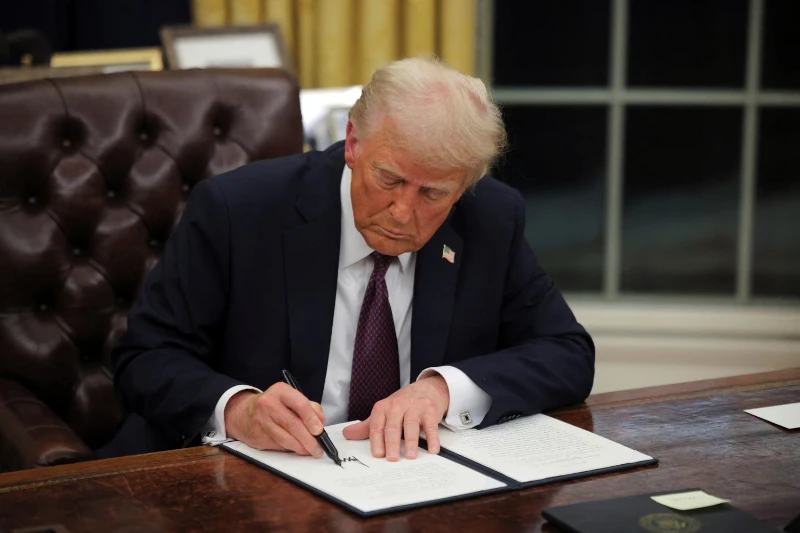"AI Regulations: A Dangerous Game?" Biden's Controversial 'AI Diffusion' Rule Sparks Fierce Debate
Concerns Mount Over Potential Stifling of Innovation and Economic Growth Amid Government Overreach in Tech Regulation
The recent controversy surrounding AI regulations has ignited a fierce debate over the balance between innovation and economic growth. The Biden Administration's proposed "AI Diffusion" rule has been at the center of this storm, raising questions about power, control, and potential risks to technological advancement. As the world becomes increasingly reliant on artificial intelligence for various applications, from healthcare to education, these new regulations have sparked widespread concern among industry leaders and experts.
The "AI Diffusion" rule aims to impose stricter controls on mainstream computing applications, potentially altering how technology is designed and marketed globally. Critics argue that such measures could stifle innovation by placing unnecessary bureaucratic hurdles in front of companies striving to push the boundaries of AI development. This move marks a significant shift from previous administrations that fostered an environment conducive to competition and growth in the tech sector.
Historically, U.S. administrations have played a pivotal role in nurturing AI development by allowing market forces to drive innovation without excessive government intervention. The Trump Administration laid much of this groundwork by promoting policies that encouraged competition while safeguarding national security interests. This approach helped solidify America's leadership in AI technology, enabling companies like Nvidia to thrive on a global scale.
However, industry leaders are now voicing concerns about what they perceive as government overreach into technology regulation. Ned Finkle, vice president of government affairs at Nvidia, criticized the Biden Administration's approach as "unprecedented and misguided," warning that it threatens to derail both innovation and economic growth worldwide.
Specific criticisms have emerged regarding how these regulations were drafted - allegedly in secret and without proper legislative review - leading some stakeholders to question their legitimacy. Such secrecy has fueled fears that these rules might be more about controlling market outcomes than genuinely enhancing national security or competitiveness against foreign rivals like China.
Many see these rules as a direct threat to U.S. technological leadership globally. By imposing stringent controls on technology already widely available in consumer hardware, critics argue that America risks losing its competitive edge just when it's needed most against rising powers like China.
Experts warn that excessive regulation could stifle innovation by limiting how technologies are designed and marketed - a sentiment echoed across various sectors reliant on AI advancements for progress. They caution against undermining systems built over decades through open competition and collaboration with international partners.
Tech companies, startups, universities - all entities heavily invested in AI research - have expressed alarm at what they see as potential roadblocks under new regulations."These rules could jeopardize future developments," said one university researcher involved in cutting-edge AI projects aimed at revolutionizing fields such as medicine.
sentiment regarding government intervention in tech industries is deeply divided. On one hand, there are those who argue that regulation is necessary to prevent monopolistic practices and ensure national security. "We can't afford to let foreign competitors outpace us in AI," said a spokesperson from the Biden Administration. "These regulations are designed to protect our technological edge and secure our economy against potential threats."
However, critics argue that such measures could stifle innovation and harm the competitive spirit that has driven American tech success for decades. "The government's heavy-handed approach could backfire," warned Dr. Emily Chen, an AI researcher at MIT. "By imposing stringent controls, we risk losing our position as global leaders in technology development."
The announcement of DeepSeek's new language model has further fueled these debates by highlighting the volatility within the AI sector. Nvidia's stock experienced significant fluctuations following DeepSeek's revelation of a competing product that promises similar capabilities with reduced computational demands.
"DeepSeek's innovations have certainly shaken things up," tweeted Morgan B., a well-known tech analyst
. The market responded swiftly, with Nvidia experiencing its largest single-day drop since 2020.Investors are now grappling with questions about whether established players like Nvidia can maintain their dominance amidst emerging competition. John Belton from Gabelli Funds noted, "This isn't the first time we've seen major tech stocks face existential challenges; history shows they often rebound stronger than before."
If companies like DeepSeek succeed in lowering operational costs for AI technologies, it could democratize access and lead to broader adoption across various sectors. This shift might disrupt current market dynamics but also pave the way for new opportunities and innovations.
As this controversy unfolds, it underscores the delicate balance policymakers must strike between fostering innovation and ensuring security. The outcome of this debate will likely influence future regulatory approaches not only in AI but across other rapidly evolving technologies as well.
In conclusion, while some view these regulatory efforts as essential safeguards against external threats, others see them as potential barriers to progress and economic growth. How this situation resolves may set precedents for how governments worldwide handle similar issues moving forward.
